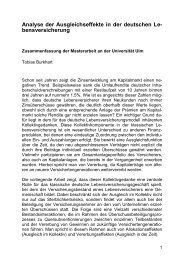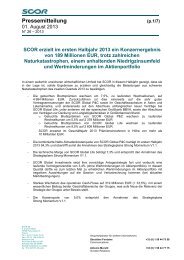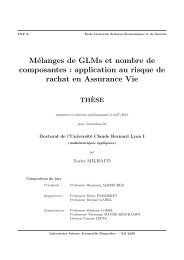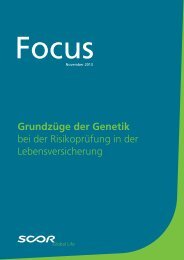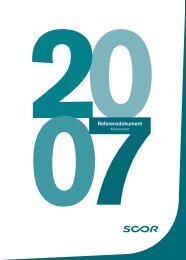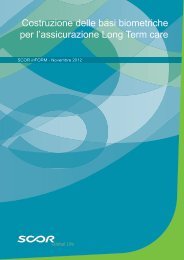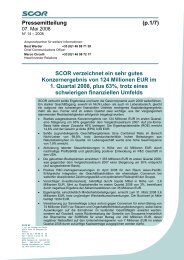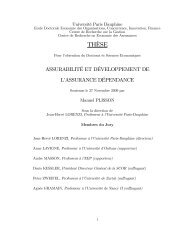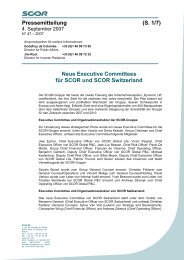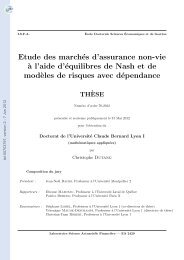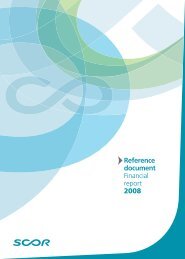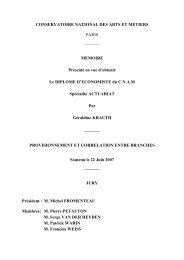4.4 Legal risk - Scor
4.4 Legal risk - Scor
4.4 Legal risk - Scor
You also want an ePaper? Increase the reach of your titles
YUMPU automatically turns print PDFs into web optimized ePapers that Google loves.
and amortization expenses related to goodwill and other intangible assets, all of which could materially adversely affect<br />
SCOR’s businesses, financial condition and results of operations. Future acquisitions may have a dilutive effect on the<br />
ownership and voting percentages of existing shareholders. The Group may also finance future acquisitions with debt<br />
issuances or by entering into credit facilities, each of which could adversely affect its business, present and future<br />
revenues, net income, cash flows, financial position, and potentially, the price of its securities.<br />
In addition, acquisitions may expose SCOR to operational challenges and various <strong>risk</strong>s, including:<br />
• the ability to integrate the acquired business operations and data with its systems;<br />
• the availability of funding sufficient to meet increased capital needs;<br />
• the obligation to comply with new regulatory requirements;<br />
• the ability to fund cash flow shortages that may occur if anticipated revenues are not realized or are delayed,<br />
whether by general economic or market conditions or unforeseen internal difficulties; and<br />
• the possibility that the value of investments acquired in an acquisition, may be lower than expected or may<br />
diminish due to credit defaults or changes in interest rates and that liabilities assumed may be greater than<br />
expected (due to, among other factors, less favorable than expected mortality or morbidity experience, or<br />
increase reserving of long tail lines of business).<br />
A failure to successfully manage the operational challenges and <strong>risk</strong>s associated with or resulting from acquisitions<br />
could adversely affect SCOR’s business, present and future revenues, net income, cash flows, financial position, and<br />
potentially, the price of its securities.<br />
The businesses SCOR has recently acquired are described in “Section 5 – Information about the issuer, 5.1.5 Important<br />
events in the development of the issuer’s business.”<br />
Specific <strong>risk</strong>s relating to the acquired businesses are as follows:<br />
A. The integration of the acquired activities may prove to be difficult<br />
The success of SCOR’s business combinations will be assessed with regards to the success of the integration within the<br />
Group. Subsequently, integrations may take longer or may be more difficult than expected. The success of integrations<br />
will depend, notably, on the ability to maintain the former client base to coordinate development efforts effectively, at the<br />
operational and commercial levels among others, and to streamline and/or integrate the information systems and<br />
internal procedures and the ability to retain key employees. Difficulties encountered in integrations could entail higher<br />
integration costs and/or less significant savings or fewer synergies than expected.<br />
SCOR is also exposed to <strong>risk</strong>s relating to the integration of the underlying data of newly acquired companies into its<br />
operating and financial accounting systems.<br />
B. An insolvency of AEGON might impair the value of business acquired (value-of inforce) of SCOR Global Life<br />
Since August 2011, the majority of the mortality reinsurance business in the United States of the former Transamerica<br />
Reinsurance Co. ("Transamerica Re") flows into SCOR via retrocession from AEGON companies. As long as underlying<br />
reinsurance agreements between cedants and AEGON companies are not novated, an AEGON insolvency might lead to<br />
premiums from clients no longer being passed on to SCOR, and thus potentially impair the value of business acquired<br />
(“VOBA”) (value of inforce) and have a significantly negative impact on SCOR’s business, present and future revenues,<br />
net income, cash flows, financial position, and potentially, on the price of its securities.<br />
C. Certain <strong>risk</strong>s relating to acquired companies may not yet be known<br />
Due notably to the size and complexities of acquisitions and despite pre-acquisition due diligence work carried out<br />
(SCOR not having always been granted complete access to exhaustive data at the time of the acquisition) and the<br />
integration work performed to date, there is a <strong>risk</strong> that all financial elements may not have been fully and/or correctly<br />
evaluated or unknown or unexpected financial <strong>risk</strong>s emerge, which may have significant consequences on the initially<br />
estimated impact of the relevant acquisition on the combined Group.<br />
D. SCOR could be exposed, due to acquired companies, to certain litigation matters<br />
SCOR could have to assume the burden of the litigation matters of acquired companies or relating to those acquisitions.<br />
The costs of these litigation matters could have an adverse effect on its future operating income and an unfavorable<br />
outcome to one or more of these litigation matters could have a material adverse effect on revenues, net income, cash<br />
flow and financial position. For further details, refer to “Section 20.1.6 – Notes to the financial statements, Note 27 –<br />
Litigation” and “Section <strong>4.4</strong>.7 – SCOR is exposed to certain litigation matters.”<br />
SCOR remains committed to exploring acquisition opportunities which may present themselves and which would be<br />
likely to deliver value for shareholders, and will rely on the consistent application of its strategic plans.<br />
30



